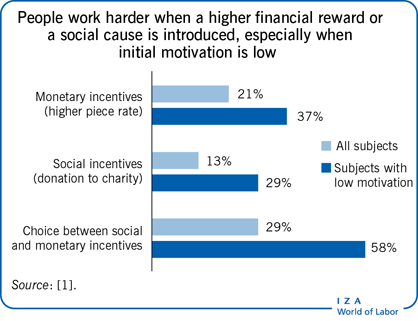Elevator pitch
Employees are more willing to work and put effort in for an employer that genuinely promotes the greater good. Some are also willing to give up part of their compensation to contribute to a social cause they share. Being able to attract a motivated workforce is particularly important for the public sector, where performance is usually more difficult to measure, but this goal remains elusive. Paying people more or underlining the career opportunities (as opposed to the social aspects) associated with public sector jobs is instrumental in attracting a more productive workforce, while a proper selection process may mitigate the negative impact on intrinsic motivation.
Key findings
Pros
Employees work harder and are more motivated when their job is associated with a genuine social cause.
Some people are willing to give up part of their private compensation to contribute to the greater good.
Socially responsible firms are also more attractive to jobseekers.
Attracting a motivated workforce is particularly important for the public sector, where performance is more difficult to incentivize directly due to multiple objectives and an output that is usually harder to measure.
In the public sector, randomized controlled trials suggest that extrinsic incentives (pay, career options) can be useful to attract a productive workforce and do not necessarily crowd out intrinsic motivation to serve the public interest.
Cons
What represents a good cause may be subjective, and a good match in terms of mission between workers and their firm is crucial.
Corporate social responsibility can backfire if perceived as instrumental.
Attracting a motivated workforce can be challenging, and the public sector appears to have had limited success.
Highlighting the social aspects of a job in the public sector may not be an effective way to recruit motivated workers.
The evidence on workers’ motivation is growing but still limited, affecting the generalizability of study findings.
